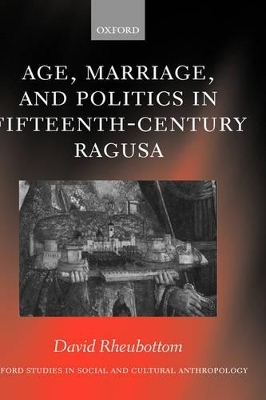
Age, Marriage, and Politics in Fifteenth-Century Ragusa
Seiten
2000
Oxford University Press (Verlag)
978-0-19-823412-8 (ISBN)
Oxford University Press (Verlag)
978-0-19-823412-8 (ISBN)
This book combines the insights of history and anthropology with innovative techniques such as computer simulation to investigate the relationships between politics, kinship, and marriage in the late-medieval city-state of Ragusa (present-day Dubrovnik). At its heart is a reconsideration of `office' and the ways in which ties of kinship and marriage were mobilized to build electoral success.
This book combines the interdisciplinary insights of history, anthropology, and computing to examine the interrelationships between politics, kinship, and marriage in a late-medieval city-state. At the heart of the study is a reconsideration of `office' and the ways in which ties of kinship and marriage were mobilized to build electoral success. In fifteenth-century Ragusa (present-day Dubrovnik) membership of the Great Council, which nominated and elected office-holders, was restricted to the legitimate male offspring of patrician brides and grooms. The patrician class was highly endogamous, and the relationship between endogamy and electoral support is an important theme running through this book. A related theme concerns the age differences between spouses, which are shown to have important structural implications for the organization of the casata, kinship relations, and marriage ties. These implications are investigated using a variety of innovative methods, including cohort analysis and computer simulation.
This book combines the interdisciplinary insights of history, anthropology, and computing to examine the interrelationships between politics, kinship, and marriage in a late-medieval city-state. At the heart of the study is a reconsideration of `office' and the ways in which ties of kinship and marriage were mobilized to build electoral success. In fifteenth-century Ragusa (present-day Dubrovnik) membership of the Great Council, which nominated and elected office-holders, was restricted to the legitimate male offspring of patrician brides and grooms. The patrician class was highly endogamous, and the relationship between endogamy and electoral support is an important theme running through this book. A related theme concerns the age differences between spouses, which are shown to have important structural implications for the organization of the casata, kinship relations, and marriage ties. These implications are investigated using a variety of innovative methods, including cohort analysis and computer simulation.
Introduction ; Ragusa: Trade and Territory ; Ragusan Government and the Quest for Offices ; The Casata ; Casata Unity: Size and Political Muscle ; Betrothal Order, Dowry, and the 'Sisters First' Principle ; The Casata, Genealogical Skewing, and Political Support ; Changes in the Great Council and Political Competition ; Bureaucracy and Office ; Conclusion
| Erscheint lt. Verlag | 8.6.2000 |
|---|---|
| Reihe/Serie | Oxford Studies in Social and Cultural Anthropology |
| Zusatzinfo | 2 maps, tables |
| Verlagsort | Oxford |
| Sprache | englisch |
| Maße | 163 x 242 mm |
| Gewicht | 491 g |
| Themenwelt | Geisteswissenschaften ► Geschichte ► Hilfswissenschaften |
| Geschichte ► Teilgebiete der Geschichte ► Kulturgeschichte | |
| Sozialwissenschaften ► Ethnologie | |
| Sozialwissenschaften ► Soziologie ► Mikrosoziologie | |
| ISBN-10 | 0-19-823412-0 / 0198234120 |
| ISBN-13 | 978-0-19-823412-8 / 9780198234128 |
| Zustand | Neuware |
| Haben Sie eine Frage zum Produkt? |
Mehr entdecken
aus dem Bereich
aus dem Bereich
der stille Abschied vom bäuerlichen Leben in Deutschland
Buch | Hardcover (2023)
C.H.Beck (Verlag)
CHF 32,15
Die Revolution des Gemeinen Mannes
Buch | Softcover (2024)
C.H.Beck (Verlag)
CHF 16,80
vom Mittelalter bis zur Gegenwart
Buch | Softcover (2024)
C.H.Beck (Verlag)
CHF 16,80


